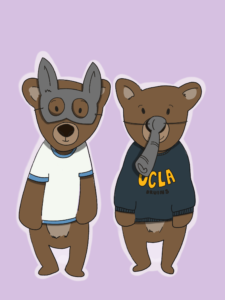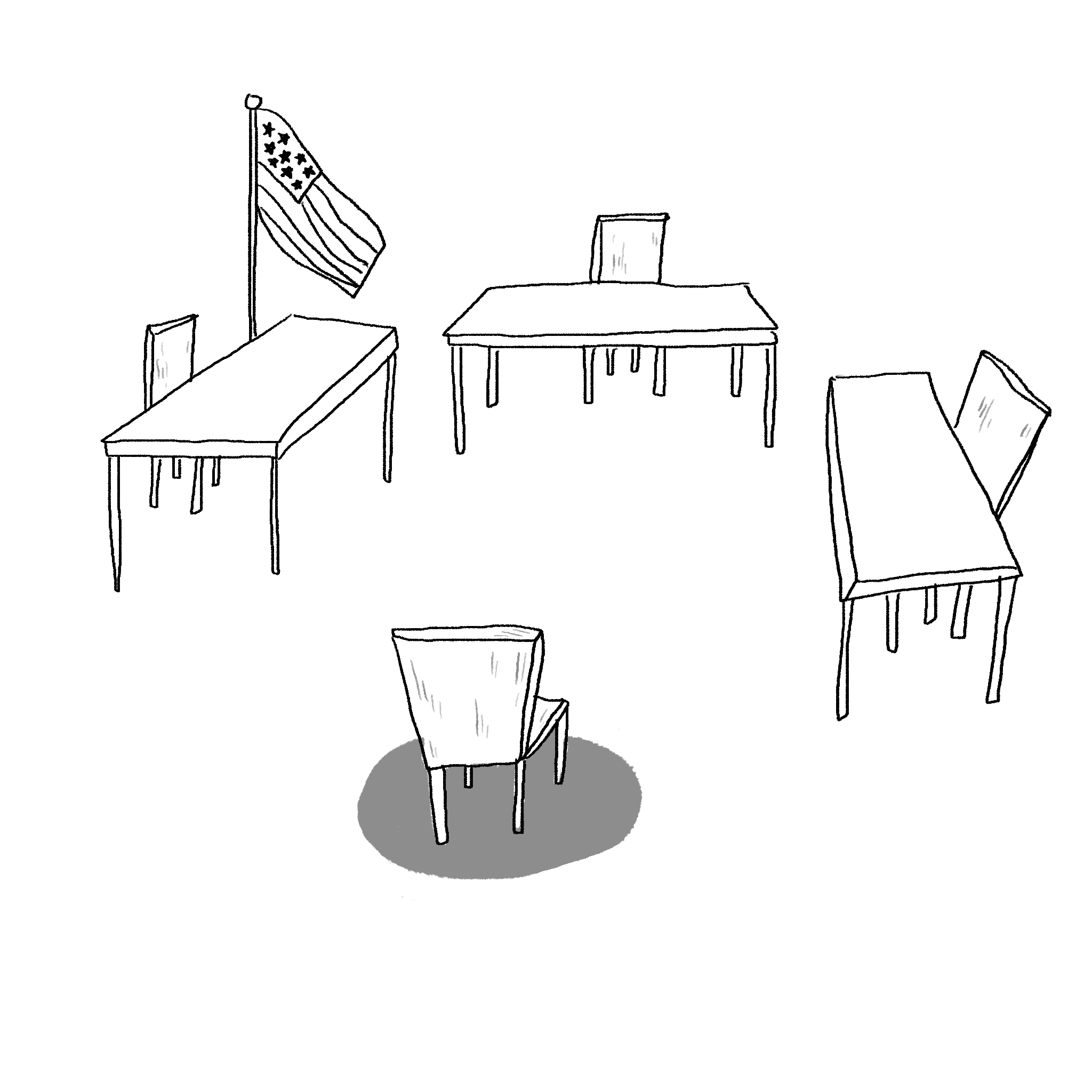(Sachi Bopardikar/Daily Bruin)
By Christopher Buchanan
July 14, 2024 at 6:03 p.m.
I sat before the Washington Monument on a humid June afternoon, mulling over the surreal presidential election barrelling our way in less than half a year. I came to Washington D.C. for a political reporting stint based mostly on that very election period. A month prior, I was stupefied to see many of those in my generation had a seeming distaste toward the civic process altogether. But as the big show comes closer, I find myself more understanding of their apprehensions.
For me, politics has always been an elusive, infatuating sport – a grand display of all things good and bad with the country. I missed the chance to vote in the last election by a few months, something I considered a grave injustice. As a 17-year-old boy, I was eager to do my part by filling in the bubble on the ballot for the candidate I thought was most befit of the presidency.
Now, I couldn’t fathom that urge, even in a repeat bout: one candidate a convicted felon, the other a sitting president who just barely stumbles through debate performances and speeches still standing. Somewhere along the road, it had all gone sour.
It seems my fellow young constituents had the same sobering feeling. According to the Atlantic, New York Times, NPR and others, young voters may be less likely to make a ballot box appearance this fall than they did during Donald Trump and Joe Biden’s 2020 prizefight.
National polling may say these students are unengaged with the election, but I wanted to double-check the math. This constituency would have a significant say in which one of these two men would guide the ol’ ship through increasingly rocky waters. So, I figured the best way to feel the political heartbeat of UCLA’s student body was to meet them where they were.
And on my first day of on-the-ground reporting, they just so happened to be frying their minds beyond belief at one of the finest public institutions in the country.
Students lined the hills of Janss Steps on April 20 like a field of budding blossoms. The celebratory air was palpable and the sun relentless, casting a scattering light through the thick cloud of smoke that overhung the crowd. The students, normally so uptight, were giving a casually defiant middle finger to UCLA’s ban on marijuana use.
I walked up the steps to a duo of fellow students in dark hoodies and thick workwear jeans, baking under the unforgiving Los Angeles sunlight. Following introductions, I asked these students what they thought of their civic duty amid our tumultuous political time.
One student looked at me with severely bloodshot eyes and a stone-cold expression, cursing me for even asking him the question with words too sordid to relay in this publication.
I recollected myself and walked down the hill, trying again to gather tangible quotes. Instead, I received hapless stares and declined interviews. There was no political disquiet on this hill, but rather a stench of collective apathy creeping in from all sides. I began to think NPR and The Atlantic were right about the state of our generation’s political thinkers…
I soon made my way to the serene sculpture garden outside of Broad Art Center, where I noticed a few scattered students who came to find some olfactory relief. I cautiously approached a young woman with headphones sitting solitary in front of a geometrically implausible sculpture. I asked her what she thought of the whole presidential ordeal.
Lily Christie, a rising third-year art student, said that both candidates have their respective Achilles’ heels that she can’t get behind. Trump’s controversial history with the seat and Biden’s increasingly divisive foreign policy might not bode well with young voters, she said.
“I honestly don’t know how I see our future at the moment,” Christie said. “I worry about Trump entirely, and I worry about Biden mainly because our younger generation I feel is kind of separating between him right now, especially with the war in Palestine.”
Christie was one of many interviewees who expressed concerns about both candidates. In an interview a month later, Matthew Feldman, a rising fourth-year history student, said that while he was proud of his inherent right to take part in a vote, he believes youths have been left to choose between two servings of spoiled cream in a bad crop.
“On one hand, you have Trump a convicted criminal, and then on the other hand, an aging Joe Biden,” Feldman said. “So not a whole lot to be excited about.”
As far as the current polls go – while historically unreliable this far out from the election – Christie and Feldman hit the nail right on the head. According to a spring 2024 youth poll run by the Institute of Politics at Harvard Kennedy School, if a vote were to be held today that included third party candidates, Biden would succeed among all young Americans by a mere three percent, at 28 points to Trump’s 25. In fact, the poll found that the only other competitive candidate is a frontrunner tied with Biden named “Don’t Know,” who would presumably score pretty well with the apathetic dopers on Janss Steps.
This disillusionment differs from the activated youth base of 2020. 54 percent of registered California youth voters showed face in the last presidential election, helping the state go predictably blue. Now, I couldn’t imagine many of the students I spoke with checking the voter registration box on a DMV form.
To better understand this discontent among young voters, I spoke with civic engagement leaders about these candidates. To my surprise, they were catching completely different signals from what I saw on the ground.
Jessica Siles, deputy press secretary for Voters of Tomorrow, said that the youth voting bloc has been more politically active than ever, even considering young people’s longstanding proclivity for activism.
“There’s this feeling amongst young voters that our futures are at stake,” Siles said. “I think young voters are having their eye out for that, ready to vote.”
I also sat down to speak with Tim Groeling, a professor of communication studies who specializes in politics. But when I asked him about how he thought the youth vote would swing in Biden’s corner, a bit of pessimism seeped out from under his dark turtleneck.
“I think it’s more unnerving, potentially, for young voters that had high hopes – especially those that were really eager and felt like they were changing the world with a vote for Biden four years ago – to see that in fact, things in a lot of ways objectively aren’t going that well right now,” he said.
Groeling said Biden’s recent political slip-ups put him in a serious bind with young voters. Besides a dubious-looking economy in the eyes of many voters, the war in Gaza is still ongoing without any signs of ceasefire – the utmost concerns cited by youth voters in the Harvard poll. Groeling said these issues may damage Biden’s desperate bid for a reseat.

This was absolutely true for Samantha Rae, a social welfare graduate student, who said it was difficult to focus on American political infighting when the war in Gaza is still ongoing.
“I’m not super confident in the ability of current presidential candidates to really represent – at least my age group – with regard to our feelings on that,” she said. “We would hope to see more direct action, or at least less support of Israel or sending weapons to Israel.”
Rae was far from alone in her stance. Many UCLA students had sacrificed the last few weeks of schooling to protest the war in Gaza, setting up encampments in front of Royce Hall to call for UCLA’s divestment from Israeli investment funds and companies. Only days later, counter-protesters violently attacked the encampment, police arrested protesters en masse and the university lambasted the student activists for their efforts. UCLA was just one of many campuses in the U.S. that participated in the nationwide protest to similar ends. Biden was in the hot seat.
Despite the levels of distaste for Biden and Wall Street Journal reports questioning his very mental acuity, sources agreed there’s virtually no chance that California will go red in the 2024 race. Still, 23 percent of registered California voters are Republican affiliates, a pretty notable voting bloc. To proceed with any good faith, I’d need to look beyond Janss Steps, which yielded few, true-blue conservative perspectives. I soon sought out a more conventional Republican student gathering.
I approached Haines Hall on a still, gray evening to attend a gathering of the proudest flag wavers UCLA could muster. Turning Point USA at UCLA, a nonprofit dedicated to conservative politics on college campuses, was knee-deep in its weekly meeting.
I walked in on three senior club members interviewing an aspiring Undergraduate Student Association Council president, surrounding him with three separate desks in a triangular formation; they resembled some kind of high council. After the candidate’s bid concluded, I asked the council if they felt their vote had any pull as minority party members in California.

Emily Ream, vice president of the chapter and a rising fourth-year economics student, didn’t mind fighting an inevitable uphill battle if it meant supporting her candidate. There were still pockets in California, such as the big red Orange County, that could tip the scales, she said.
“LA might be more of a virtue signal vote, but I think if you’re in the right area, it definitely helps,” she said.
The council also told me they thought Trump had a much more attractive personality for Generation Z and were optimistic that a “red wave” was headed to California to crash over the heads of new voters. However unfathomable I thought this was at the time, with a potential for less participation from a largely Democratic youth voter base, it seemed – to me – a real possibility someday.
In the course of conversation, Ream briefly mentioned that our generation had become increasingly nihilistic toward our political institutions and their place in it all. I heard a similar sentiment from Alvina Shea, a rising fourth-year public affairs student and chair of BruinsVote, who said that one of the biggest problems facing young voters is not believing their vote matters, something she firmly disagrees with.
“It’s just hard because a lot of people here do understand the electoral system and understand it’s inevitably going to come down to several candidates,” Shea said. “But that’s not really a reason not to vote.”
Shea’s optimism was not entirely contagious amongst our youth. Another student, Marcus Grijalva, a rising fourth-year transfer psychobiology student, closely resembled one of the budding civic nihilists that Ream spoke of.
“I really don’t feel that motivated to vote in California because the state is so Democratic that, in the presidential race, my vote doesn’t matter,” he said. “The state’s going for Biden.”
I felt like I had finally found the thread that could tie up this whole mess of a youth electorate. From my perspective, these sources seem to refute our generation’s suspect apathy towards the American tradition of presidential voting – we at least have some vested interest – and instead feel they don’t have any genuine say in the big finale. Perhaps they do care deeply about politics, but the care it seems to have for them is not so apparent.
Maybe it’s always been this way. Now, sitting in the nation’s capital, I myself even began to feel frustrated about the irony of the whole presidential process as I looked on at the monument that was supposed to commemorate the father of a fresh system, chock-full of potential. It’s almost insulting, as a youth myself, to have seen and read about young people on the streets for decades now, protesting against climate change, the invasion of Iraq and the fall of Roe v. Wade without much to show for it. Sometimes it feels like our hippie compatriots, with whom we still share a favorite euphoric pastime, failed to move the pendulum during the Vietnam War, only to swing back, sell out and become the stubborn group of politicians and voters marring the current political landscape.
Throughout these interviews I’ve only concluded that no matter how students feel, wars will rage on, the oceans might boil and the economy will continue operating like a pachinko machine. No matter who becomes president, the nation will continue to impose itself on the international stage. Some students’ faith in the system is dwindling as it all unfolds before their young eyes like deja-vu.
Grijalva summed it up well enough: Both candidates will fund the same wars, get paid off by the same lobbies and disregard the same all-too-important issues facing the youth. But whoever our politicians are, Grijalva will still choose to wake up, go to school and be as good a person he can, he said.
This feeling could very well explain why those students settled on Janss Hill that hot April afternoon and covered each other with an opaque veil of smoke. Maybe the only way to feel like you really matter is to put your head in the clouds and look down at all the uncontrollable insanity with a certain degree of indifference.

